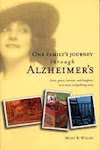1955- I had never met my great-grandmother, Annie Jackson. I was just four years old when she came to visit us at our home on the East coast from her farm in Missouri. I mistakenly thought her middle name was "Pneumonia," which was really not much more peculiar than her actual name, Ammonia. She seemed so very old to me and different from other elderly people I had been around. Her floral print apron covered most of her dark dress; she stood tall and straight, her black shoes were laced up the front and neatly tied. Something about her was so special; simple, yet wonderfully elegant.
As she sat rocking one afternoon, savoring a ray of mid-day sunlight, she patted her lap motioning for me to come up. I climbed up warily and found it to be a sparse lap, not much "cushioning," as laps go, but now, for the very first time, I could look directly into her face. Her eyes gazed kindly through her delicate wire framed glasses. Her skin appeared almost translucent as the sun's rays now flooded the room.
I was about to hear a story that I would never forget. I would think of it
often throughout the years ahead and toss it around in my mind from many
different angles. But now I could only listen and filter it through the mind of
a four-year-old, reveling in such a contented and undisturbed life.
"When I was just a little girl, not much older than you," she began. Sheepishly my eyes perused her hands, so old, with veins thick like purple crayons, wrists no bigger around than my own.
"Was she really young like me?" I mused as her mellow, faraway voice lured me to another time... And I could see my great-grandma, as a young girl, just like me.
(The following excerpt contains the written words of Annie Ammonia Jackson. It is a story that has been passed down in our family from one generation to the next; one of those stories that just stays with you -almost hauntingly - yet is passed on as a priceless treasure).
The John Jackson family was living in Page County lowa in 1879 when they decided to migrate to western Kansas where government land could be taken up by a man with a family to make a home. The family consisted of nine children, the oldest being a boy George who was twelve years old; the next two were boys, Jim, and Charley. Then followed six girls; Ella, May, Mattie, Annie, Addie, and Alma who was less than a year old.
In the early spring of 1879, we started to move in a covered wagon drawn by one
horse, driven by a young man who wanted a chance to "see the west."
We would travel as far as possible in a day and as night came on we'd stay at a
farm house where we were allowed to spread our beds on the floor, get up in the
morning, load up and travel on. One night we stopped where there was a sick
child, not seriously seemingly, so they said we could stay. During the night the
child grew worse and our father saddled two horses, one for himself and one for
the Doctor who came back with him. When the doctor had examined the child, he
pronounced it a case of scarlet fever. At that time scarlet fever was
considered a dangerous and contagious disease and sometimes fatal.
Our parents realized what we were in for with all those children but the only thing to do was to travel on to our destination, Wa Keeney, Trego County, in the western part of Kansas. We were a number of days reaching the place and with a very sick bunch of children. No one cared to come near us or let us into their home. But our father finally found a one- room house, which he could and did buy. He and the young driver went to work building bunk beds on one side of the room and the sick children were put into them. A doctor came but it seemed that nothing he could do helped. Making a long story short, within three weeks, three little girls, Ella, May and Addie, had been buried out on the prairie in the newly laid out cemetery, two of them in the same grave.
Our father got out on his claim and broke up some ground and planted some corn which came up and grew fairly well until it was about knee high when "the hot winds" (for which that country was noted) began to blow, wilting the corn. About the same time a cloud of grasshoppers settled down on that community in the afternoon. By morning all that was left of that corn were stubs three or four inches high and every green plant had been destroyed. That was a dismal time, especially for poor folks who depended on extra work to be found to pay living expenses; but no work was found.
Father decided to try gathering bones and try to sell them which was done and were shipped east from the depot there and were used in the older states for fertilizer. Father would take the three boys in the wagon with him and they'd follow the valleys which were strewn with buffalo bones which were left when the Indians killed them in former years. They'd pick up bones and fill the wagon box and take them to the depot and sell them to be shipped. For some time that was the only income to pay living expenses.
Knowing that the winters out there were severe and plenty of snow, they couldn't depend on bones in the winter, so our parents decided they'd have to go back east before winter. Pa had heard that northwest Missouri was a good place for a poor man to make a living so they decided to go there. The preacher was so good go us. He came one Saturday night and insisted that my parents come to his service the next night as he had prepared a message hoping to give encouragement to the many discouraged members. So Ma asked our brother George if he could care for the children so she and Pa could go to the service. So they went. I heard them comment on the service from the text, Exodus 14:13-"Stand still and see the salvation of the Lord." After talking it over they decided it might not have been the Lord's will for them to have come out there in the first place, so they went ahead making plans to leave.
They sold the single horse and spring wagon to pay funeral expenses.
We were glad to get started back in the covered wagon, but we had our troubles on the way. Father had a hard chill which he was subject to and we had to stop at Blue Rapids, Kansas for a while. Ma took in washing until he was able to travel on. I was in my fifth year (1879) but I remember the last night in Kansas at White Cloud. We stayed with a family where there were several children, some older than we were. It was in October -a beautiful moonlit night. They suggested that we go out in the yard and play games. We were playing hide and seek and one of the girls took brother Jim and me telling us she would show us where to hide. She took us round the house into a shed kitchen and back in the corner was a kraut barrel. The girl reached down into the barrel and got a handful of kraut and gave us each a bite. We thought it was about the best thing we had ever tasted, as we had had nothing of the kind for so long. "We got in free." Later we were to hide again, so we two, Jim and I, slipped away and around to the kitchen by ourselves. But imagine our disappointment when we found that we couldn't reach the kraut. After à moments thought, Jim said, I tell you what, I'll lift you up and hold you by the knees and you reach in and get the kraut." We did just that and no one else knew about it.
The next morning, we loaded up and went down to the river, drove the wagon onto the flat boat and crossed the Missouri river to Forest City, Missouri. By that time the team was getting tired, so the three boys walked much of the way. Going up the Forest City hill we met a colored boy eating an apple and holding another one in his hand. Jim stepped right in front of the boy and said, "I'll give you this purse for that good apple." They traded right then, and Jim ran to overtake the wagon to give us kids a bite of the apple.
We stopped at the outskirts of Oregon Missouri for Pa to inquire where there might be a house we could rent. The man where he stopped said there was an old house out in his orchard we were welcome to live in until we could look around for a permanent home. Oh, what a wonderful sight met our eyes when we got to the little house-the ground was covered with apples! We children thought, "Now our hard times are over." And in truth the family never regretted coming to Missouri- they felt they had been led by the Lord to this good country.
❧
As a young girl, I remember lying awake at night envisioning that simple
wagon crossing the vast, lonely prairie. I could picture Annie and her three
young sisters huddled together at nightfall for warmth and comfort, her sisters
the ages of my three younger brothers. My six brothers were my world. The
thought of leaving half of my world behind, as she had to, made me shudder.
As a young wife and mother, immersed in the joy and contentment of "mothering" my young children, I could not fathom the pain Annie's mother must have endured. Was she so different than I am?
And now as a mature woman, having crossed some prairies of my own, I think
about this story and wrestle with other aspects of it.
How would I have responded to the minister's words, "this move was not the
Lord's will after all," after burying three precious children on the prairie?
Did my great-great Grandmother wrestle with this conclusion on their trip back East?
How I would love to know her thoughts- how she survived this!
Yet we are only given Annie’s story-told from the perspective of a nine year old; a story that so impressed a four-year-old girl, that she has now passed it on to you. ~Mary B Walsh




No comments:
Post a Comment